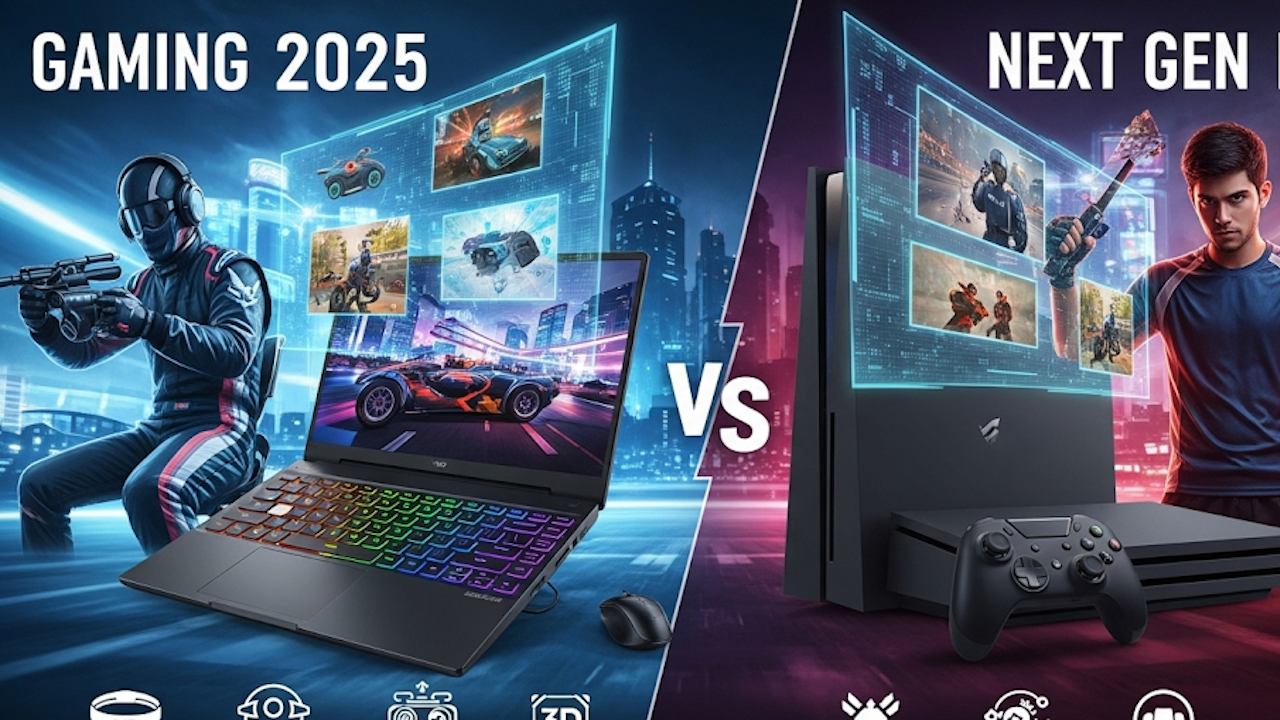As we move further into 2025, the gaming landscape is more dynamic and competitive than ever. With powerful new hardware, increasing emphasis on mobility, and the rise of cloud gaming, the age-old debate between gaming laptops and consoles continues to evolve. Each platform has carved out a distinct niche, but for many gamers, choosing between the two remains a tough decision. To determine which one truly “wins” in 2025, we must compare them across several critical dimensions: performance, portability, game library, price, customization, and ecosystem.
Performance: A Narrowing Gap
In previous years, gaming laptops often lagged behind consoles in terms of raw gaming performance due to thermal and size limitations. However, 2025 has seen remarkable advances in laptop GPU and CPU design. NVIDIA’s RTX 5000 series mobile GPUs and AMD’s Ryzen 8000 series processors, optimized for both efficiency and power, have allowed premium gaming laptops to rival – and sometimes exceed – the performance of PlayStation 5 Pro and Xbox Series X2.
That said, consoles still hold a unique advantage. They are designed specifically for gaming, enabling developers to optimize games for a fixed hardware set. This optimization often results in better performance-per-dollar compared to laptops. However, gaming laptops have closed much of this gap and offer higher frame rates, faster load times (thanks to PCIe Gen 5 SSDs), and support for higher resolution displays when equipped with the right hardware.
Portability and Flexibility: Laptops Lead
One of the strongest arguments for gaming laptops is their inherent portability. In 2025, laptops are thinner, lighter, and more battery-efficient than ever. High-end models like the ASUS ROG Zephyrus or the Razer Blade 17 combine powerful specs with sleek designs that can be used for work, study, or creative projects. The ability to game anywhere—whether on a plane, at a café, or in a dorm room—makes laptops a top choice for gamers who value mobility.
Consoles, in contrast, are still primarily stationary devices. While handheld consoles like the Nintendo Switch 2 and PlayStation Portal have enhanced portability, flagship consoles like the PS5 Pro or Xbox Series X2 are meant to be part of a fixed setup. For on-the-go gaming, consoles just can’t match the flexibility of laptops.
Game Library and Exclusives: Still a Console Stronghold
While the gap in game availability has narrowed thanks to cross-platform development and PC ports, consoles continue to dominate when it comes to exclusives. Sony’s PS5 Pro features must-play titles like Spider-Man 3, The Last of Us: Rebirth, and Ghost of Tsushima 2, which remain tied to the PlayStation ecosystem for months or even years before coming to PC.
Xbox, meanwhile, leans on its Game Pass subscription service, offering day-one access to major titles across console and PC. However, some titles remain optimized for the Xbox experience, and playing them on a laptop may still involve compromises like lower performance or clunky optimization.
On the other hand, gaming laptops offer access to a massive library of PC games across Steam, Epic Games Store, and other platforms. With mod support, early access titles, and indie gems that may never make it to consoles, the PC gaming experience is broader and more customizable.
Price and Value: Consoles Take the Lead
In 2025, price remains one of the most significant factors for gamers. Gaming consoles typically retail between $499 and $699, offering excellent value for their performance. Bundle deals and subscription services like PlayStation Plus and Xbox Game Pass further enhance the value proposition.
Gaming laptops, especially those capable of matching or surpassing console performance, are considerably more expensive. Expect to pay between $1,200 and $3,000 for a high-end model. While the laptop also functions as a productivity machine, the initial investment can be steep, making consoles the better choice for budget-conscious gamers.
Customization and Upgradability: PCs Still Rule
For those who like to tweak settings, upgrade hardware, or build the perfect gaming rig, laptops offer limited but still valuable customization options. In 2025, more laptops support external GPU docks and modular memory or storage upgrades. However, they still pale in comparison to desktop PCs.
Consoles are largely closed systems with minimal customization beyond storage upgrades and controller accessories. This makes them simple and consistent but limits user control over the gaming experience.
Ecosystem and Community: A Mixed Bag
Consoles excel in offering streamlined, curated ecosystems. Features like PlayStation’s integrated social tools, Xbox’s seamless cloud saves, and both platforms’ achievement systems foster a strong sense of community. Multiplayer experiences are usually more plug-and-play on consoles, with unified voice chat and matchmaking.
Gaming laptops, tied to Windows or Linux, offer greater versatility but can be more fragmented. Steam and Discord provide robust communities, but the experience can vary from game to game. However, for users who value cross-platform play, mods, and non-gaming applications, laptops win on versatility.
Conclusion: It Depends on the Gamer
So, which wins in 2025—gaming laptops or consoles? The answer depends on your priorities.
- If affordability, ease of use, and exclusive titles are your top concerns, consoles are still the king.
- If you prioritize portability, performance flexibility, and access to a broader game library, a gaming laptop is the superior choice.
Ultimately, the gap between the two has never been smaller, and the decision is more about lifestyle than limitations. As gaming continues to evolve, both platforms are likely to coexist and thrive, serving different but overlapping segments of an increasingly diverse gaming community.

